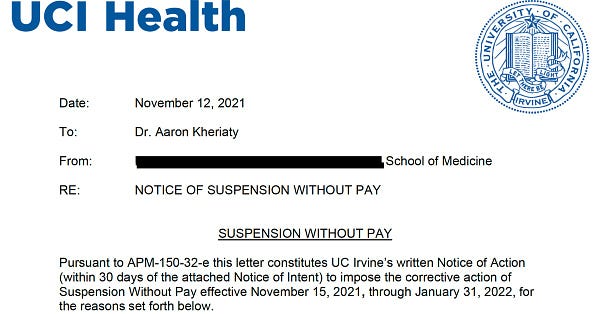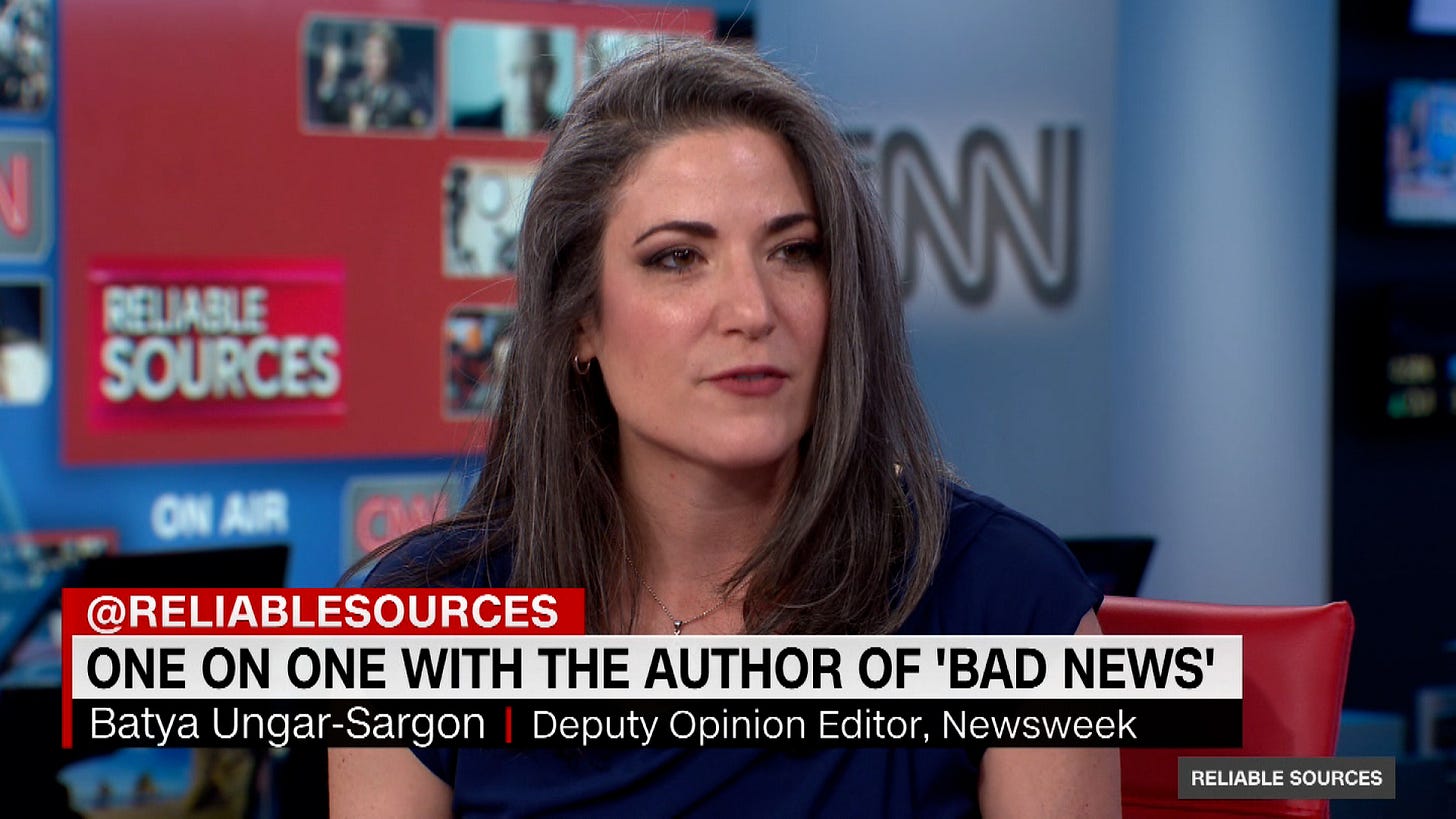Batya Ungar-Sargon Called Out the College Elites, but Nobody Seems to Get It
I was one of the few people who had no clue who Batya Ungar-Sargon was, but when I caught wind of her book Bad News: How Woke Media Is Undermining Democracy, I knew I needed to read it. I reached out, and Batya being the awesome person she is, she sent me an early copy to check out. From the moment I started reading it, I couldn’t stop. I spent hours consuming the book and finished it within a day or two. The entire time, I just kept thinking, “FINALLY! Someone gets it!” Despite having a PhD from Berkely, Batya sees what’s going on, and it’s great to finally feel seen, and I’m not alone.
I’m a college dropout, and I’ve struggled my entire life. I’m the son of an alcoholic mom, and I ended up battling my own addiction from 18 years old until 27. Due to my addiction, my prime years for college were wasted. Since getting sober in 2012, I’ve known that I’ve had to work 10x as hard to even hope to keep my head above water without a degree. I’m a 36-year-old father to a son who is almost 13, and I fight like hell to provide that kid with stability. Regardless of the job I have, I work harder than most and have always been promoted quickly. Still, I can barely afford an apartment, and it’s a struggle to pay bills. Worst of all, I’ve lost my last two jobs at no fault of my own due to the businesses failing. So, when I see someone like Batya writing a book explaining how millions of people like me have been left behind due to the ridiculous culture wars, I’m extremely grateful.
Batya’s book begins with the history of journalism and how people fought to give a voice to the working class. She explains how giving people the news of what’s going on was a sign of dignity. Back then, being a journalist was something anyone could do despite their education, and they could talk about the problems that mattered to their communities. Eventually, places like the New York Times realized they could make a ton of ad money by writing for the wealthy because advertisers with expensive products want to get in front of the right income brackets. Since then, it’s only become worst with digital media.
For a long time now, I’ve sat back and watched these privileged journalists at media outlets who haven’t experienced a day of struggle in their life speak for me. Batya breaks it down in her book extremely well, too. She explains how journalism has become an industry for the college elite, and she shows the pipeline of the best schools people go to in order to get writing gigs at top publications. Now, they focus more on culture war issues so they can pretend to care about the working class while not upsetting their corporate overlords.
All I wanted was for Batya’s book to take off so more people would understand this, and it has. I’m so happy for Batya because I’ve met a lot of people over the years, and Batya seems to have a truly good heart, so it’s awesome to see her book get so much attention. She’s even been able to write for multiple publications to give more exposure to the book. And recently, she had a clip go viral of her conversation with Brian Stetler, which then led to her being invited onto Tucker Carlson’s show.
Unfortunately, while I was excited that the real issue was finally getting attention, all anyone seems to hear is “woke media bad.”
So, why am I writing this? I hopefully want to shed light on the fact that the root of the problem of Batya’s book has gone completely unnoticed. I’ve put together a brief list showing that the people in power who are promoting Batya’s book are just as guilty. They primarily host and promote the work of the college elite, and it’s exactly what Batya is trying to bring attention to. And to finish this piece, I have some practical solutions.
And before we get started, if I haven’t made it clear yet, Batya is one of my favorite people, so this is nothing against her. She’s a pain to get a hold of sometimes, but I forgive her because she’s insanely busy lol. Batya is one of the few people who genuinely cares about the working class. Not only did she take the time to come on my tiny podcast, but she gave my college dropout self the opportunity to write a piece for Newsweek not long ago.
Let’s get started.
Bari Weiss
I’m going to start with Bari Weiss because although I criticize her a bit, it’s only because I think/hope she can snap out of it. She seems like a good person who has got caught up in her growing brand of the anti-woke like many others. Bari has been a huge promoter of Batya’s book.
Bari’s education:
After high school, Weiss went to Israel on a Nativ gap year program, helping build a medical clinic for Bedouins in the Negev desert, and studying at a feminist yeshiva and the Hebrew University of Jerusalem.[7][9]
Weiss attended Columbia University in New York City, graduating in 2007. She founded the Columbia Coalition for Sudan in response to the War in Darfur.[10] Weiss was the founding editor from 2005 to 2007 of The Current, a magazine at Columbia for politics, culture, and Jewish affairs.[11][12] Following graduation, Weiss was a Wall Street Journal Bartley Fellow in 2007, and a Dorot Fellow from 2007 to 2008 in Jerusalem.[8][13]
Although we’re focusing on education, it’s important to note Bari’s father, Lou Weiss, is a successful business owner and has written for years as well. While I don’t know for certain if Lou started writing before or after Bari’s success, I’m always looking for signs of nepotism. The hill I’m always willing to die on is that meritocracy is a myth, and if you do two seconds of research, you’ll find that more than 90% of successful people come from successful families.
Now, let’s take a look at who recently wrote for Bari Weiss’ Substack publication:
Nellie Bowles - Bari’s wife and former New York Times reporter. Went to Columbia University and fellow at McGill University
Peter Savodnik - Went to University of Chicago and Middlebury College
Antonio García Martínez - Berkeley PhD student in physics
Then, you’ll find the outlier, Rob Henderson. Rob has a story I could relate to, and he’s one of the rare cases of someone succeeding despite terrible circumstances growing up. Personally, I’m on the fence about Rob because now he is in the college elite circle after going to Yale and studying at Cambridge. Only time will tell if he helps the people from where he came from or just talks about it like the current college elites.
Krystal Ball and Saagar Enjeti of Breaking Points
I love Krystal and Saagar and watch Breaking Points regularly. But, I’ve noticed they’re part of this group as well, but they do attempt to discuss the working class a bit more by covering workers strikes and other topics. The issue is who they are, who they promote, and who they platform. Again, Batya’s book is discussing the college pipeline, and we have more advantaged people covering the problems of people like me rather than platforming and lifting up the working class.
Krystal Ball - Went to Clemson University and University of Virginia
Saagar Enjeti - Went to The George Washington University and Georgetown University
Note: I’m also noticing how many people went to two universities. Without a full scholarship, college is expensive, and this is also important to remember.
Here are some of their recent guests who are journalists:
Glenn Greenwald - Went to George Washington University and New York University School of Law
Kyle Kondik - Went to Ohio University and Johns Hopkins University Advanced Academic Program
Oren Cass - Went to Williams College and Harvard Law School
Jan Jekielek
I found this one pretty interesting purely based on who Jan is and the quote he shared from Batya on Twitter


Jan’s education - The University of British Columbia and University of Alberta
Here are some of the recent tweets he’s shared from or about other college elites


Kash Patel - University of Richmond and Pace University School of Law


Larry Sanger - Reed College and Ohio State University





I could honestly do this all day long, but I hope that you, the reader, get the point I’m trying to make. It’s either extremely deceptive or completely ignorant to promote stand by the message of Batya’s book while doing what she’s criticizing. If you’re only platforming and promoting the work of the college elite, you’re also part of the problem. Batya clearly lays out the privileged position the majority of these people come from, and that’s an issue.
If your biggest takeaway is “woke media bad”, nothing is going to change. The only thing worse than people like me who have to watch woke media distract from the real issues is to also witness people who pretend to care about people like us engage in these arguments for personal gain.
I said I’d conclude with a solution, and here it is: take two seconds out of your day and help someone that doesn’t come from privilege.
I’ll give you a great example from personal experience, and I hope Batya doesn’t mind that I’m going to tell this story.
One day, on my morning walk, Batya DMed me because I shot her a couple pitches for opinion pieces at Newsweek and asked if she could call. Batya, as busy as she is, spent about 30+ minutes with me on the phone explaining to me the world of freelance writing and how to pitch to editors. She told me what I was doing right and what I was doing wrong. She gave me advice on angles she thinks I could write about. Since then, I’ve sent her pitches, and when she has time, she sends me feedback about why something doesn’t work or how I could improve it. Then, when I finally had a pitch she liked, she spent time giving me suggestions for edits to make the piece better.
I cannot tell you how much that meant to me. Weeks before that, I was laid off from my stable job out of nowhere. I have a son, no health insurance, and I started spiraling into depression and anxiety about what the future holds. For someone like Batya to take time out of her day to give a shit is something that stays with people like me for a lifetime.
The difference between Batya and some of the people promoting her work is that Batya doesn’t just talk the talk; she walks it too.
And I’m just using my experience as an example, but it’s not about me. I know for a fact that although my situation sucks, there are many more in far worst situations than I’m in. The point is that we don’t have to wait around for Congress to change laws and help people; we have the power and ability to help each other. And it’s so damned easy, too.
People like me don’t need more “awareness” around our plight. People like us need help and opportunities. As Robert Frank explains in his amazing book Success and Luck, successful people are the least likely to give any credit to luck and just believe it’s all due to their hard work. Hard work and skill are important, but not only does luck play a role, but success also depends on somehow avoiding bad luck.
Since I had no insurance or money when I got sober, I had to do it through free 12-step programs. Do you know why Alcoholics Anonymous has worked for millions of people for 100 years? Because the only thing they ask is that if you succeed in the program, you help others. Regardless of your opinions of AA, I can’t tell you how much better this world would be if successful people helped others.
I’ve been working on organizing all the books I’ve read, and I have multiple lists of books on becoming a better thinker. There are lists for education, social issues, critical thinking, self-deception, and biases. For the rest of the categories, click here.
I’m always open for a conversation and to be shown what I might be missing or where I may be wrong, so feel free to email me at TheRewiredSoul@gmail.com




